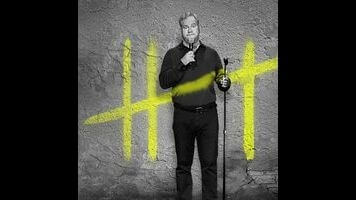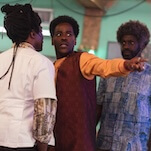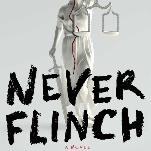When Jim Gaffigan is described as a “clean,” it can’t help but feel like a bit of an insult. Yes, Gaffigan largely avoids swear words or sexual references in his act, but to call what he does “clean comedy”—the Netflix synopsis for his new special, Cinco, calls him the “king” of the stuff—it’s like saying that’s all he does. But that’s not the case: Over the last 15 years, Gaffigan has proven himself to be one of our most intelligent observational humorists, and that trend continues the 74-minute set that makes up Cinco.
Gaffigan has a brilliant way of taking the more indefensible aspects of modern culture, and, if not defending them, at least explaining why we happen to like them so much. One of Cinco’s most poignant bits touches on America’s fascination with SUVs, noting that despite knowing the damage the vehicles cause to the environment, plenty of Americans still buy them up eagerly. He notes with some accuracy that while we dislike the idea of the gas-guzzling monster vehicle, when we’re behind the wheel, we’re exhilarated. This feels like the spiritual successor to his McDonald’s bit; the key is Gaffigan’s non-judgmental tone, the way he’s able to mock these vexing cultural tendencies without coming off as snobbish because he engages in them, too. Here’s to hoping his next special has a bit about the NFL.
Cinco also looks at technology’s effects on society, tackling binge-watching as well as smartphones. After hearing so many rants from other comics about how bad smartphones are, Gaffigan’s nuanced approach to modern technology feels refreshing—as part of the bit, he weighs the convenience of smartphones against the satisfaction of hanging up a landline phone in anger. He’s not trying to tell us what’s wrong and right about out technological leanings, he simply observes and interacts with them, and his observations are almost uniformly spot-on.
The comedian’s Catholicism and his love for food come together in the special’s funniest bit, as he ponders Jesus’ bread-multiplying abilities, and wonders if the disciples would’ve been disappointed if he had only been able to produce pumpernickel and Melba toast. It’s a small portion of the show, but it encapsulates why Gaffigan’s humor works so well, and why his audience stretches far beyond the people who would be interested in a good clean Christian comic. It’s such a peculiar observation, yet such a clever one, the type of thought that could be equally appreciated by a weekly churchgoer or a stoner.
Throughout the special, he talks a lot about his children, and the experience of losing one of them in a museum (which also made up an episode of his short-lived-but-great sitcom), and the uncomfortable experience of having the security guard return your child to you. Gaffigan’s sense of self-deprecation remains as strong as ever, particularly when he talks about why you should never visit the Holocaust museum if you happen to look like Jim Gaffigan. (“That’s the guy who did it!”). Gaffigan is always his own favorite target, and it’s a big part of why he’s so charming; there’s nothing you could say about him that he hasn’t already said about himself. And when he said it, it probably got a big laugh.







































